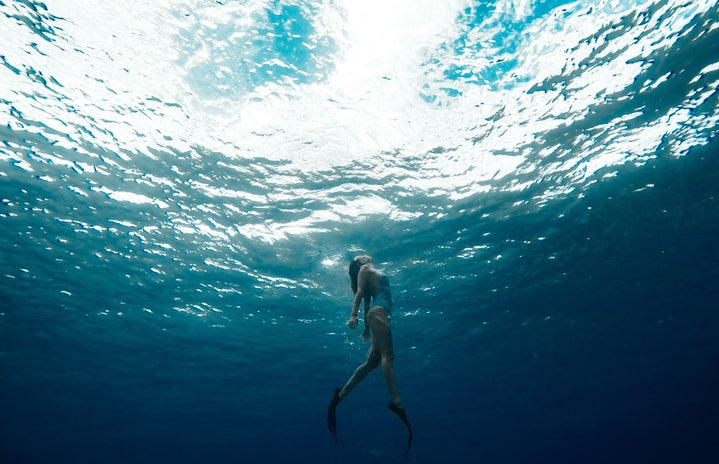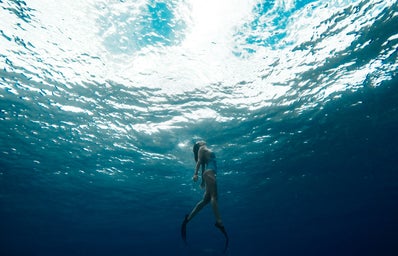We often think “this would never happen to me or someone that I love” until it happens, and your world is suddenly upside down. That’s how it was in our family when my 17-year-old sister, Solveig, dealt with an eating disorder. We have always been very close since day one and we used to train for the same swimming club for years, but in 2018 she started slowly fading away from me until it felt like I´d lost her.
- How it happened
-
It all started in 2017 when she began feeling pain in her elbow. After a visit to the doctor, it was clear she had Panner’s disease. It occurs in teenagers, but the disease is temporary and takes two to six years to heal. When not enough blood can access the tissues in the bone, they die and a hole starts to form. Because of this decrease in training, she wanted to do better in other areas to stay in shape. The state Solveig got into could also be a mix of being a “control freak.” The disease was something she couldn´t control. However, she found something that she could control, and she went all in. Reflecting on the situation, Solveig stated that, “I was shocked that I had to almost quit swimming, but I did some kicking. With time, I got depressed because my self-image was all built on my sport. I thought it was easier to hate my body more by eating less to punish myself. I downloaded the MyFitnessPal app because it helped me to count all my calories. Very soon I knew the calories for every single food by memory.”
- The bottom
-
Two years after the diagnosis, Solveig hit the bottom. The hole in her elbow was almost healed but being back in training so skinny was not good. “I had mastered the skill of lying so the disease had been going on for a lot longer,” she said. She had lost control, one example being her friend telling her to delete the MyFitnessPal app, and she explained the situation. “Before I knew, I was screaming like Gollum protecting his precious ring, that was my disease talking. This is the worst part about the disease, how much the personality changes. I didn’t have any opinion or any emotion anymore, except anger. Thinking about food took all my energy so there was nothing else left.” My parents Harpa and Baldur were getting seriously worried, her plan of staying in shape had turned into a nightmare.
- “No matter how many times I took her to the doctor, no one seemed to understand the seriousness of the disease.”
-
My mother’s words; “The best offer the health care could give us was a six-month long waitlist for mental help.” Harpa and Baldur were not giving up and they found a private counselor. Solveig explained her experience with the counselor, “it turned out that we never really connected. The counselor just kept saying that things take time, and it will get better, but I was only getting worse.”
When the ban on gatherings hit Iceland in March 2020, everything collapsed. Solveig had become even sicker. To explain the risk, an eating disorder is life-threatening both mentally and physically. It can destroy your body and people can lose the will to live. For example, Solveig was not getting her period any longer among other organic errors. “Her appetite regulation was destroyed, she had no idea when, how much, or what to eat anymore. Her brain had also shut down to survival mode, she was already reaching the point where she couldn’t study, talk to friends, no nothing. Her brain was starving,” my mom said.
- “Are we just going to interfere with something that we know nothing about?”
-
My parents had to make a difficult decision to stop seeing that counselor, and my father emphasizes, “We didn’t know what we were doing. The only thing we knew was that something felt wrong. She had been seeing the counselor for a year with no result. We had heard of a special mental institution for children and teenagers in Iceland. She was lucky to get a spot.” It was a strong team of counselors, doctors, and nutritionists, all specialized with adolescents with eating disorders. “The team fixed her within a few months, they gave us instructions to keep an eye on her at all times and make sure that she eats food that her body desperately needs,” my father added.
- How swimming helped
-
By the end of 2020, she was eating again without feeling terrible, but all of this effort would have been useless if Solveig did not have the strong will to get better. Swimming was the key to Solveig´s recovery. She realized that if she would not eat, she would never become a better swimmer. Solveig is still under supervision, but it is priceless to see her dancing with herself and smiling again. She added in the end: “It helped me a lot to see what my body could do for me, like wow, my muscles help me move fast in the water! It is just such a relief. Who thinks anyway when they are 90; yes! I was this size when I was younger!? In the end, you only think about the people you met and the memories you had from your eventful life.”
- What to do if you are someone in this situation
-
Solveig said there are more things that can help others in the same situation. “First of all, get help sooner than later! It’s important to find a counselor that you connect with and is specialized in eating disorders. Yes, it is hard to get started, but think of it as a period that will help you through the rest of your life. Just remember that IT WILL GET BETTER. Anyone can get through this if intervened in time and they want it bad enough.” To help see improvement and find purpose, she talked about goalsetting. Find a way that shows you clearly that you are making progress. It could be for school, for example: to improve my grades I need to eat more. It could also be goals for your happiness: How many days am I happy each week? Future goals are also important to think about on the hard days. Solveig also added, “Mom and dad used to cheer me on by saying; ‘The future is in this one slice of pizza’ because she knew what would happen if she would not get better. She would not be able to have children, not have the energy to get a degree or keep her friends, then what is there left to have a good life?
Do not hesitate to reach out to these resources for help!
The Renfrew Center: https://renfrewcenter.com/
The Emily Program: https://www.emilyprogram.com/your-recovery/get-help-now/


